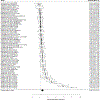Mindfulness-based psychosocial interventions and psychological wellbeing in cancer survivorship: a meta-analysis
- PMID: 38561221
- PMCID: PMC11556419
- DOI: 10.1080/17437199.2024.2336014
Mindfulness-based psychosocial interventions and psychological wellbeing in cancer survivorship: a meta-analysis
Abstract
Purpose: Among cancer survivors, mindfulness-based interventions appear promising in decreasing distress for cancer patients, but little attention has been paid to the ultimate mindfulness goal of increasing psychological wellbeing. This meta-analysis aims to summarise and synthesise available evidence concerning the effectiveness of MBIs on positive psychological outcomes reflecting key aspects of psychological wellbeing in heterogeneous cancer patients.
Methods: A literature search of mindfulness-based randomised clinical trials in cancer survivors was conducted across six electronic databases. Two reviewers independently screened studies and extracted data. Meta-analyses were conducted using R; standardised mean difference (SMD) was used to determine intervention effect. Moderators examined included therapeutic orientation, control group type, treatment modality, treatment target, heterogeneous vs. homogeneous cancer type, and facet of wellbeing.
Results: Thirty-one studies were included (N = 2651). Those who received mindfulness-based interventions reported significantly higher eudaimonic, hedonic, and social wellbeing than respondents in control groups (SMD = 0.599). Interventions were equally effective across therapeutic orientation, control group type, treatment modality and treatment target. There were trend level differences favouring homogeneous cancer diagnosis groups over heterogeneous diagnosis groups.
Conclusion: MBIs provide an effective treatment for increasing psychological wellbeing in cancer survivors. This finding has important implications for clinical practice.
Keywords: Cancer; meta-analysis; mindfulness; positive psychology; survivorship; well-being.
Conflict of interest statement
The authors report there are no competing interests to declare.
Figures



References
-
- Arch JJ, Mitchell JL, Genung SR, Judd CM, Andorsky DJ, Bricker JB, & Stanton AL (2021). Randomized trial of acceptance and commitment therapy for anxious cancer survivors in community clinics: Outcomes and moderators. Journal of Consulting and Clinical Psychology, 89(4), 327–340. 10.1037/ccp0000630 - DOI - PubMed
-
- Becker BJ (1988). Synthesizing standardized mean-change measures. British Journal of Mathematical and Statistical Psychology, 41(2), 257–278. 10.1111/j.2044-8317.1988.tb00901.x - DOI
Publication types
MeSH terms
Grants and funding
LinkOut - more resources
Full Text Sources
Medical
